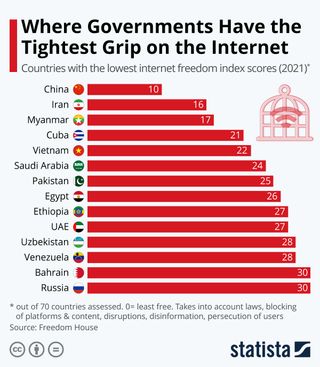How 'excessive government interference' is threatening internet freedom as we know it
VPNs, encryption and social media freedom are at risk

It was no surprise that the recent law proposed in India forcing VPN companies (among others) to retain data for up to five years, sparked such outrage across the tech industry and its users. A number of the best VPN services vocally criticized the new directive, raising concerns over the negative impact it would have on people's privacy.
However, India is not alone. This is just the latest attempt to curb the freedom of the internet as we know it. As ExpressVPN vice president Harold Li told us: "While we find their actions deeply concerning, this type of excessive government interference is neither new nor unique in the current geopolitical landscape."
According to the 2021 Freedom House report, at least 48 countries out of the 70 analyzed carried out legislative or administrative actions with the aim of regulating tech companies over the past year. New regulations range from how platforms treat content to how these need to store and share users' data.
Although all this isn't necessarily a bad thing - if well-crafted these directives actually have the potential to mitigate online harm - these regulations can easily be abused to enforce mass surveillance on citizens while repressing dissident voices.
In a world where the freedom of the internet keeps worsening - according to Freedom House this has already been happening for 11 years in a row - what's at stake for people's privacy and free speech online?
The grip over users' data is tightening up
India's new data law is only the latest move from governments to acquire more control over people's data while undermining the work of security software like proxies and virtual private networks. As a government official said to The Economic Times: "It's an evolution. All the countries are moving in that direction."
That's sadly true. Around 38 nations pursued legal reforms affecting tech companies’ management of users' data in 2021, Freedom House reported. Like in the case of India, domestic data storage is particularly worrying in countries with a bad track record when it comes to citizen surveillance in the name of public security.
Are you a pro? Subscribe to our newsletter
Sign up to the TechRadar Pro newsletter to get all the top news, opinion, features and guidance your business needs to succeed!
This type of excessive government interference is neither new nor unique in the current geopolitical landscape.
Harold Li, ExpressVPN vice president
Across Asia, governments have been recently active in drafting new rules or implementing old legislation. As Pakistani lawyer and internet activist Nighat Dad told Wired UK: "South Asian governments are basically competing with each other in this operational Olympics around violating the digital rights of their citizens.”
Vietnam's Cybersecurity Law now requires both large and small online platforms to collect data on local servers for authorities to access in case of public order related matters. The vagueness of this directive puts journalists and activists at high risk. The same thing happened in Bangladesh with its new data protection bill, while Pakistan is seeking to force social media companies to establish data servers within the country.

Concerns have also been raised in Indonesia where, since the end of 2020, digital platforms must register with the communications ministry whilst granting access to their systems and data on request. Not to mention China with its 2017 Cybersecurity Law that is forcing tech companies to store users' data on local servers and decrypt those following authorities' orders.
And the trend keeps enduring with countries like United Arabic Emirates and Turkey, for example, requiring the local storage of users' confidential data. In Iran, if the proposed Regulatory System for Cyberspace Services Bill becomes law, foreign tech firms will need to collect and provide the identity and history of their users’ activities upon government request.
Authorities' battle against encryption
Not just the privacy and security of users' data is under siege, governments across the world are threatening to undermine encryption too. This process to scramble data to make it unreadable to third parties is the base for cybersecurity tools like Tor and VPN services as well as secure messaging apps such as Signal.
In May 2021, WhatsApp sued the Indian government stating that the traceability requirements of identifying the "first originator of information" will actually violate the constitutional right to privacy. At the same time, Pakistan requires social media and service providers with more than 500,000 users to share with authorities decrypted data if requested.
Under the proposed Internet Freedom, Responsibility, and Transparency Act, in Brazil private messaging apps will need to store for three months data of viral messages - these are those forwarded to more than five accounts that reach at least 1,000 users.
There are also many countries where VPNs have been made illegal (like in Russia, Turkey, North Korea), while other nations are trying to ban (Iran, for example) or limiting their use for similar reasons (China and UAE).

The battle against end-to-end encryption seems to be at the top of worldwide democratic leaders' agenda, too. They see this practice as an impediment to national security, criminal, and child sexual abuse investigations. However, these regulations still have the potential of being misused to the detriment of civil liberties.
Take the controversial EU draft rules to counter child abuses online as an example. Once becoming law, it will force messaging companies to scan private chats to check for harmful content. If implemented, the directive will bring in a de facto ban to end-to-end encryption. Privacy experts are calling the invasive proposal unworkable, leading to creeping mass surveillance. While other fears that this could also undermine US users, where abortion rights are rapidly declining.
This document is the most terrifying thing I’ve ever seen. It is proposing a new mass surveillance system that will read private text messages, not to detect CSAM, but to detect “grooming”. Read for yourself. pic.twitter.com/iYkRccq9ZPMay 10, 2022
Free speech online is at risk
Furthermore, the attempt to moderate the content shared online is sparking concerns among experts. With more and more countries proposing new legislations aimed to take direct control on social media platforms' moderation content, a limited freedom of expression and increased censorship online seems to be the possible outcomes.
"The danger posed by the worst initiatives is immense," reads the 2021 Freedom of the Net report. "If placed in the hands of the state, the ability to censor, surveil, and manipulate people en masse can facilitate large-scale political corruption, subversion of the democratic process, and repression of political opponents and marginalized populations."
Bangladesh, India, Indonesia, Myanmar, Pakistan, and Sri Lanka all have been reported to experience a decline in internet freedom, with Myanmar marking the most severe downturn that the report has ever documented.
Not to mention countries like Russia, China and Turkey where social media platforms and dissident voices are actively censored on an almost daily basis.

However, even Western democracies are seeking to expand their control over what people post online. Even if the apparent intention might be aimed to eliminate harmful speech, the opportunity for these regulations to be abused is high.
Even though the UK Online Safety Bill - currently being discussed in the House of Common - recognizes the duty to protect journalistic content and free of expression, every day users will have their posts removed if deemed "legal but harmful" content.
The vagueness of this directive, together with the fact that politicians will have a say to what social media platforms will need to censor, has sparked many concerns. So far, a petition against this point has already reached more than 50,000 signatures.

As the founder of Hide.me VPN, Sebastian Schaub, wrote recently on TechRadar: "Internet freedom is very much under threat. When you see governments around the world making moves to exert greater control over their internet fiefdoms, it is done under a banner of falsehoods - citizens are told that it is being done for some kind of greater good, to provide safety or to keep business strong.
The truth is that they want greater control over their people, the ability to spy on them, to deny them platforms from which they can espouse their views. That people should be free to share ideas, knowledge and opinions with others underpins the notion of free speech, democracy, freedom."


Chiara is a multimedia journalist committed to covering stories to help promote the rights and denounce the abuses of the digital side of life—wherever cybersecurity, markets and politics tangle up. She mainly writes news, interviews and analysis on data privacy, online censorship, digital rights, cybercrime, and security software, with a special focus on VPNs, for TechRadar Pro, TechRadar and Tom’s Guide. Got a story, tip-off or something tech-interesting to say? Reach out to chiara.castro@futurenet.com
